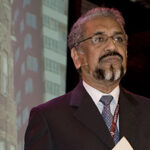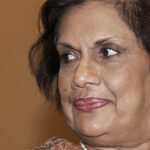SHARING THE BURDEN – SHARING THE BENEFITS
An open letter to the Financing for Development Summit
22 June 2015
The Members of the Club de Madrid have followed the Post-2015 Agenda process and the parallel Financing for Development process with keen interest. As has been said many times, it is a “once in a generation” opportunity to set a vision for the next 15 years, and this vision can be positive, fair, inclusive, leaving no one behind and respecting the planet. We have been encouraged by the progress being made and congratulate all those who have been involved in these negotiations. But we are aware that, the third session of negotiations on the outcome document for the Funding for Development Summit were not able to complete the drafting process in spite of extra sessions over the weekend, and we appreciate that Member States have agreed to continue work on the document this week.
As co-chairs of the Shared Societies Project of the Club de Madrid, we recognise the efforts that have been made and it is in that spirit we urge Member States to keep at the forefront of their negotiations the principle that a durable effective outcome will only be realised if it is inclusive and fully reflects the concerns and interests of all stake holders. We have been particularly heartened by the repeated recognition in the negotiations of the importance of involving, and respecting the interests of, all sections of society, or, as we say, “Building a Shared Society”. We believe that it is only through an inclusive approach that the Goals can be effectively realized in the years to come. The proposed Sustainable Development Goals and Agenda already reflects that approach and it seems they are likely to be accepted at the Summit at the United Nations Headquarters in September. However it has been recognized for some time that the biggest challenge facing the Post-2015 Development Process is the issue of funding and there is still much uncertainty and argument about how the necessary actions to meet the Goals will be financed. If that question cannot be resolved, the Goals could become, regrettably, an aspirational wish list.
Therefore the current discussions on Financing for Development are critical and the Summit in Addis Ababa in July is one of the last opportunities, if not the last opportunity, to reach a consensus on the way forward.
We urge all the participants in this process to make this a seminal moment in the progress of our planet and leave a proud legacy for the benefit of future generations. And we take the liberty or making some comments on the means to resolve outstanding issues.
New Perspectives on the Challenges
As a result of ongoing discussions with key participants in the Post-2015 Process and in the preparations for the Financing for Development Summit, we recognise that there is a great deal of good will among states to create a long term framework for financing for development.
However we identify a number of mindsets or ways of framing the arguments which inhibit progress towards a successful outcome.
1. We are concerned that there is a tendency for some parties to present their arguments in terms of their specific preferred solution, which normally means placing the responsibility on others: developed economies must commit to providing Overseas Development Aid at the level of 0.7% of GDP; developing economies must increase their tax base; the corporate sector has to contribute more, both through increased investment and philanthropy; or scale up the social and solidarity economy.
The negotiations could easily become locked in confrontation between these and other perspectives. But no single strategy will release the level of funding required. Nor is it reasonable to expect some parts of the global community to pick up the costs of development if other interest groups are not prepared to make their contribution.
So it is important for the parties to ensure that the debate remains a shared concern which will require a multi-level multi-pronged outcome.
2. A second danger is that the debate is narrowed to consideration of means to unlock additional sources of finance, without considering how the existing global financial architecture drains finance out of the system and in particular out of developing countries. While there are numerous references to these issues in the current draft, we were disappointed that it was decided to remove from later drafts a key phrase from paragraph 1 of the Zero Draft which seemed to encapsulate the aim of the whole Post-2015 process and which distinguished it from the Millennium Development Process:
‘We commit…. to build an inclusive and equitable global economic system where no country or person is left behind’.
Tax havens, unfair terms of trade, weak global and national governance systems, corruption, the absence of accounting for environmental costs in private and public projects are just some of the reasons why resources are drawn away from development. So it is important not only to look at remedies but also to consider the causes of the lack of funds for development in order to find appropriate political and legal responses.
It follows that there must also be robust and inclusive mechanisms to facilitate implementation and review of the measures that are agreed.
3. Thirdly, there is the danger that providing resources for development (whether through ODA, taxation or as part of corporate social responsibility), is perceived as a burden rather than an opportunity. If funding for development is seen as a burden, or if it is presented to states, taxpayers, companies and share holders as a moral duty , support is then grudging and at a minimal level. It is also justified as a means to gain public recognition or economic and political advantage as a result of one’s generosity. Such attitudes do not inspire funding for development. So it is important to present funding for development in a positive light and something which will create benefit not only for the recipient of development funds but for all of us, highlighting the benefits for future generations.
There is ample evidence that we all benefit if the poorest countries, and the most disadvantaged groups within all countries, are able to make social and economic progress. Markets expand, social tensions and security challenges are reduced, and resilience increases with a corresponding decrease in the need for and dependence on humanitarian assistance. There is a real human and economic return on investment and support.
We believe the way to overcome these challenges is through a positive, multi-faceted and inclusive approach to funding for development which could command broad-based support and facilitate the desired outcome from the summit. Such an inclusive approach has been an ongoing goal of the Members of the Club de Madrid, and, through its Shared Societies Project, has been concerned to build more inclusive Shared Societies at national level and a more inclusive global community.
With its partners, Friedrich Ebert Stiftung and Centre of Concern, the Shared Societies Project convened experts from the main global and regional intergovernmental organisations and together they developed an outline of such a new framework: The Global Shared Societies Agenda to promote Long Term Inclusive and Sustainable Growth[1]. We commend this Agenda to the Summit because it tackles the dangers already outlined in this letter. It is not intended as a finished blue-print to be implemented as it stands, but as an indication of the form such an Agenda might take, if negotiated by state parties.
In conclusion, and to reiterate our central message, we call on the state parties to ensure that the final discussions on funding for development seek inclusive, multi level, multi-pronged solutions, as this is the basis on which a positive outcome can be achieved.
We would appreciate any comments or queries that you might wish to share with us.
Chandrika Bandaranaike Kumaratunga
President of Sri Lanka (1994-2005)
Valdis Birkavs
Prime Minister of Latvia (1993-1994)
Cassam Uteem
President of the Republic of Mauritius (1992-1997, 1997- 2002)


